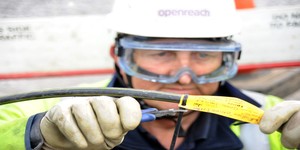
Ofcom, the UK's communications regulator, has reached an official agreement with industry giant BT that will see the company's Openreach division spun off into a legally distinct entity as a means of addressing competition concerns.
BT's monopololy position in the UK telecommunications market started entirely literally: the General Post Office ran the telephone network on behalf of the government between 1912 and 1969, with no other companies permitted to provide connectivity or even telephone handsets themselves. Eventually, privatisation came along and the corporation was floated as two separate entities: the Post Office and British Telecommunications. Since then, BT has had a de facto monopoly on last-mile copper connectivity within the nation - bar Hull, where for historical reasons a separate company Kingston Communications runs its own local monopoly - despite continuous complaints from the competition.
In 2006, following an investigation into alleged anticompetitive practices, BT spun its network management and wholesale businesses out as Openreach. The idea was that Openreach would treat BT as any other customers, doing away with the benefit BT had previously enjoyed as being its own internal provider. That didn't go far enough for the company's competitors, though, and following further complaints the UK's communications watchdog Ofcom agreed with the announcement that BT would be asked to fully split from Openreach. Now, that discussion has reached an end: BT has agreed to split itself near-completely from Openreach, which will become a truly separate business entity.
Under the agreement, Openreach will become a wholly distinct company, though still held under the BT Group, with its own articles of association and the requirement that directors will be expected to make decisions which are in the interest of all Openreach's customers and not just BT. The company will be run by the Openreach Board, a group made up of directors who are primarily independent of BT, and the new Openreach will have its own strategy and annual operating plans within a budget set by the BT group.
Openreach's executives, meanwhile, will be accountable to the Openreach Board rather than BT Group, and all 32,000 staff will be directly employed by the new company rather than by BT. All Openreach assets, including the physical telecommunications network, will be held by Openreach rather than BT, and any large scale investments it makes will need to be discussed with all customers including Sky, TalkTalk, and Vodafone. Finally, all trace of BT branding - where Openreach was traditionally referred to as BT Openreach - will be purged.
'This is a significant day for phone and broadband users. The new Openreach will be built to serve all its customers equally, working truly independently and taking investment decisions on behalf of the whole industry – not just BT,' claimed Sharon White, Ofcom's chief executive, of the agreement. 'We welcome BT’s decision to make these reforms, which means they can be implemented much more quickly. We will carefully monitor how the new Openreach performs, while continuing our work to improve the quality of service offered by all telecoms companies.'
BT's monopololy position in the UK telecommunications market started entirely literally: the General Post Office ran the telephone network on behalf of the government between 1912 and 1969, with no other companies permitted to provide connectivity or even telephone handsets themselves. Eventually, privatisation came along and the corporation was floated as two separate entities: the Post Office and British Telecommunications. Since then, BT has had a de facto monopoly on last-mile copper connectivity within the nation - bar Hull, where for historical reasons a separate company Kingston Communications runs its own local monopoly - despite continuous complaints from the competition.
In 2006, following an investigation into alleged anticompetitive practices, BT spun its network management and wholesale businesses out as Openreach. The idea was that Openreach would treat BT as any other customers, doing away with the benefit BT had previously enjoyed as being its own internal provider. That didn't go far enough for the company's competitors, though, and following further complaints the UK's communications watchdog Ofcom agreed with the announcement that BT would be asked to fully split from Openreach. Now, that discussion has reached an end: BT has agreed to split itself near-completely from Openreach, which will become a truly separate business entity.
Under the agreement, Openreach will become a wholly distinct company, though still held under the BT Group, with its own articles of association and the requirement that directors will be expected to make decisions which are in the interest of all Openreach's customers and not just BT. The company will be run by the Openreach Board, a group made up of directors who are primarily independent of BT, and the new Openreach will have its own strategy and annual operating plans within a budget set by the BT group.
Openreach's executives, meanwhile, will be accountable to the Openreach Board rather than BT Group, and all 32,000 staff will be directly employed by the new company rather than by BT. All Openreach assets, including the physical telecommunications network, will be held by Openreach rather than BT, and any large scale investments it makes will need to be discussed with all customers including Sky, TalkTalk, and Vodafone. Finally, all trace of BT branding - where Openreach was traditionally referred to as BT Openreach - will be purged.
'This is a significant day for phone and broadband users. The new Openreach will be built to serve all its customers equally, working truly independently and taking investment decisions on behalf of the whole industry – not just BT,' claimed Sharon White, Ofcom's chief executive, of the agreement. 'We welcome BT’s decision to make these reforms, which means they can be implemented much more quickly. We will carefully monitor how the new Openreach performs, while continuing our work to improve the quality of service offered by all telecoms companies.'

MSI MPG Velox 100R Chassis Review
October 14 2021 | 15:04








Want to comment? Please log in.